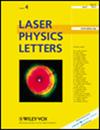Quantum state classification via complex-valued neural networks
IF 1.4
4区 物理与天体物理
Q3 OPTICS
引用次数: 0
Abstract
To efficiently complete quantum information processing tasks, quantum neural networks (QNNs) should be introduced rather than the common classical neural networks, but the QNNs in the current noisy intermediate-scale quantum era cannot perform better than classical neural networks because of scale and the efficiency limits. So if the quantum properties can be introduced into classical neural networks, more efficient classical neural networks may be constructed for tasks in the field of quantum information. Complex numbers play an indispensable role in the standard quantum theory, and constitute an important feature in quantum theory. So if complex numbers are introduced in classical neural networks, they may outperform the common classical neural networks in dealing with the tasks in the quantum information field. In this paper, we verify this conjecture by studying quantum state classification via complex-valued neural networks (CVNNs). The numerical results show that the performance of CVNNs is much better than the real-valued neural network in classifying the entangled states. Our results not only provide a new way to improve the performance of artificial neural networks in quantum state classifiers, but also might shed light on the study of CVNNs in the field of other quantum information processing tasks before the appearance of the universal quantum computer.通过复值神经网络进行量子态分类
为了高效地完成量子信息处理任务,应该引入量子神经网络(QNN)而不是普通的经典神经网络,但由于规模和效率的限制,量子神经网络在当前嘈杂的中尺度量子时代无法表现得比经典神经网络更好。因此,如果能将量子特性引入经典神经网络,就有可能构建出更高效的经典神经网络,用于量子信息领域的任务。复数在标准量子理论中扮演着不可或缺的角色,是量子理论的一个重要特征。因此,如果在经典神经网络中引入复数,它们在处理量子信息领域的任务时可能会优于普通经典神经网络。本文通过研究复值神经网络(CVNN)的量子态分类来验证这一猜想。数值结果表明,在对纠缠态进行分类时,复值神经网络的性能远远优于实值神经网络。我们的研究结果不仅为提高人工神经网络在量子态分类器中的性能提供了一条新途径,而且可能为在通用量子计算机出现之前,在其他量子信息处理任务领域研究复值神经网络提供启示。
本文章由计算机程序翻译,如有差异,请以英文原文为准。
求助全文
约1分钟内获得全文
求助全文
来源期刊

Laser Physics Letters
物理-仪器仪表
CiteScore
3.30
自引率
11.80%
发文量
174
审稿时长
2.4 months
期刊介绍:
Laser Physics Letters encompasses all aspects of laser physics sciences including, inter alia, spectroscopy, quantum electronics, quantum optics, quantum electrodynamics, nonlinear optics, atom optics, quantum computation, quantum information processing and storage, fiber optics and their applications in chemistry, biology, engineering and medicine.
The full list of subject areas covered is as follows:
-physics of lasers-
fibre optics and fibre lasers-
quantum optics and quantum information science-
ultrafast optics and strong-field physics-
nonlinear optics-
physics of cold trapped atoms-
laser methods in chemistry, biology, medicine and ecology-
laser spectroscopy-
novel laser materials and lasers-
optics of nanomaterials-
interaction of laser radiation with matter-
laser interaction with solids-
photonics
 求助内容:
求助内容: 应助结果提醒方式:
应助结果提醒方式:


